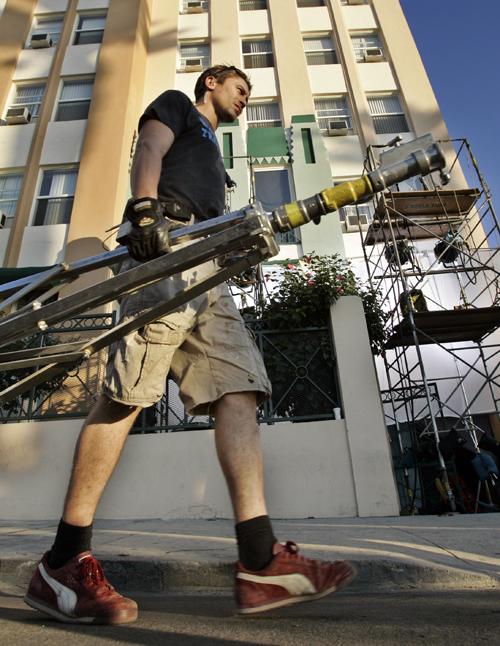Hollywood writers on verge of strike, seeking money, respect in talks with producers
A set worker carries a light stand as lights on scaffolding shine into rooms during the production of an Internet feature on a location shoot in Los Angeles on Wednesday. Writers, producers and a federal mediator continued talking Wednesday with the hope Reed Saxon, The Associated Press
November 2, 2007
LOS ANGELES – For two decades, Hollywood writers have clamored for a bigger slice of profits from video sales, only to be turned back by studios insisting uncertain economics meant they had to stick with the status quo.
This time, the writers might not back down.
The Writers Guild of America was on the verge of calling its first strike in nearly 20 years Thursday after negotiations collapsed and their contract with producers expired Wednesday night.
Officials called a meeting of the union’s 12,000 members for Thursday night and were expected to discuss whether to walk out.
Guild members recently authorized their negotiators to call the first strike since 1988, if necessary.
Get The Daily Illini in your inbox!
“The guild has never had the resolve to go the distance,” said Harris Goldberg, screenwriter of “Deuce Bigalow, Male Gigolo.” ”They feel that if they don’t do it now, they’re never going to be able to do it again.”
Respect is also at stake, with many writers feeling they have never commanded the same clout in the entertainment industry as actors and directors.
“I don’t think it’s something we can negotiate for,” said Paul Guay, who co-wrote the movies “Liar, Liar” and “Heartbreakers.” ”What we can negotiate for is money. How we assess respect and worth in this town is money.”
If writers do strike, the first casualty would likely be late night talk shows, which are dependent on current events to fuel monologues and other entertainment.
A strike would not immediately impact film or prime-time TV production. Most studios have stockpiled dozens of movie scripts, and TV shows have enough scripts or completed shows in hand to last until early next year.
The key financial issue in the talks involves changing the formula for paying writers a share of DVD revenue then applying the same equation to money made from material offered over the Internet and other digital platforms.
Studios, represented by the Alliance of Motion Picture and Television Producers, are dead set against increasing DVD royalties.
Writers and actors have been fighting for years to reverse what they see as a huge mistake made at the dawn of home video, when no one was sure if selling movies on VHS cassettes would ever make money.
The unions agreed to ignore the first 80 percent of revenue from the tapes – and later DVDs – assuming most of the money represented the cost of manufacturing and distribution.
Writers settled for just 1.2 percent of the remaining 20 percent, a figure that amounts to about 3 cents on a DVD that retails for $20.
Writers are now asking for their share to be calculated on 40 percent of revenue and argue the same formula should be used for digital distribution because studios have almost no costs associated with that technology.
Consumers are expected to spend $16.4 billion on DVDs this year, according to Adams Media Research.
By contrast, studios could generate about $158 million from selling movies online and about $194 million from selling TV shows over the Web.
“Every incremental window of distribution has added revenue and profitability to the business model,” said Anthony DiClemente, an entertainment analyst for Lehman Brothers Equity Research. “Digital is likely to be a positive thing for the studios.”
Studios argue that it is too early to know how much money they can make from offering entertainment on the Internet, cell phones, iPods and other devices.
Producers are uncertain whether consumers prefer a pay-per-view model over an advertising-supported system. They want the economic flexibility to experiment as consumer habits change in reaction to technology.
“The management teams don’t know what the correct economic models are going to be for digital downloads,” DiClemente said. “Then there is the grand, broad concern of digital piracy that overhangs the whole conversation.”
Writers, however, are worried that whatever deal they strike now will remain in the contract for the next 20 years, and if they fail to win increases, another huge revenue stream will pass them by.
“Whatever deal gets struck for new media is going to be set in stone for the next several decades if history is any guide,” said Jonathan Handel, an entertainment lawyer at the Los Angeles law firm of TroyGould.
Any increase in royalties would come in addition to salary. A newcomer to TV’s writing ranks now earns about $70,000 per season for full-time work on a show.
Veteran writers who move up to a story-editor position get at least a low six-figure salary, with a “written by” credit on an hourlong script paying an additional $30,000 plus residuals.
The negotiations have revolved as much around emotions as economics, said Doug Wood, a partner with the law firm of Reed Smith who has negotiated with actors on behalf of advertising agencies.
“The industry negotiates form logic, and the creative community negotiates from emotion,” he said. “Trying to understand those differences on both sides of the table is a big challenge in any of these negotiations.”







